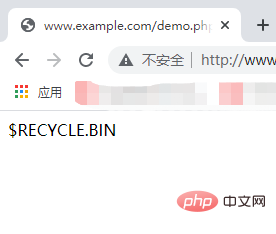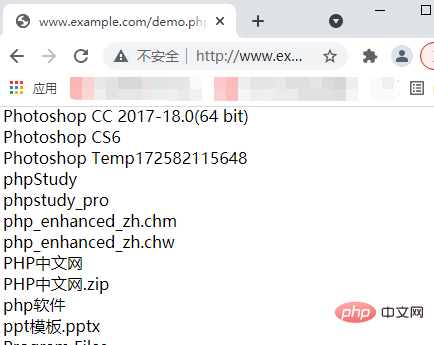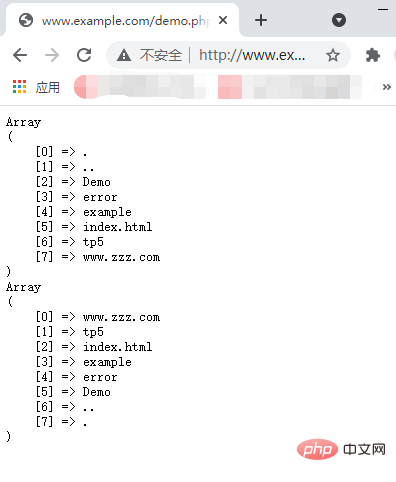 Backend Development
Backend Development
 PHP Tutorial
PHP Tutorial
 How to get the file name in the directory in PHP (summary sharing)
How to get the file name in the directory in PHP (summary sharing)
How to get the file name in the directory in PHP (summary sharing)
In the previous article "Knowledge Summary of Closing and Opening Directories in PHP File Processing", the relevant knowledge of how to open and close directories in PHP was introduced in detail. Let's continue to look at this article. Let’s take a look at how to obtain relevant knowledge about files in a directory in PHP. Among them is the knowledge about opening and closing directories in our previous article. I hope it will be helpful to everyone!

We have learned how to open and close a directory in PHP. Before closing the directory, the directory will be operated. One of the commonly used operations is to obtain the contents of the directory. Files and folders.
In other words, if you want to know how to get the files in the directory, you must first open and close the directory, so opendir() function and closedir()If you don’t understand the function yet, you can click on the link above to learn. Let's take a look at how to obtain the files in the directory in PHP.
In PHP, we can complete the operation of obtaining the file name in the directory through the readdir() function and the scandir() function.
<strong><span style="font-size: 20px;">readdir()</span></strong>Function gets the next file name in the file
readdir() The function is a simple operation. It is simple because when the function is executed successfully, it can return to open the directory through the opendir() function A file or directory name in; if the function does not execute successfully, the returned result is flase.
The basic syntax format of the readdir() function is as follows:
readdir([resource $dir_handle])
It should be noted that: $dir_handle is an optional parameter. When filled in, it means is the directory parameter opened through the opendir() function.
Next, let’s take a look at the use of the readdir() function through an example. The example is as follows:
<?php
$dir = 'D:';
if(is_dir($dir)){
$info = opendir($dir);
$file = readdir($info);
echo $file.'<br>';
closedir($info);
}
?>Output result:

This writing method in the above example is generally not used. Generally, if you want to obtain the files in all directories through the readdir() function, you need to obtain them through a while loop. The example is as follows:
<?php
$dir = 'D:';
if(is_dir($dir)){
$info = opendir($dir);
while (($file = readdir($info)) !== false) {
echo $file.'<br>';
}
closedir($info);
}
?>Output result:

In this way, we complete the acquisition of the file name in the target directory through the readdir() function and the while loop. This is the application of the readdir() function. Next, let's look at another method, which is the scandir() function.
<strong><span style="max-width:90%">scandir()</span></strong>Function, returns the directory file name in array form
We learned above that the readdir() function can obtain the file name in the target directory, and with the while loop, the file or directory name in the directory can be obtained simply and directly. The scandir() function to be discussed next is somewhat different from the readdir() function.
readdir()The function can only return one file name at a time, but thescandir()function can return all files in the target directory after successful execution. The file name and directory name;readdirThe result returned is directly the name of the file,scandirThe result returned is also the name of the file but it is The result returned in the form of an array;readdirIf the function is not executed successfully, the returned result is false,scandirWhen the function is not executed successfully The returned value is also flase but there will also be an error message.
Let’s take a look at the basic syntax of the scandir() function. The example is as follows:
scandir(string $directory[, int $sorting_order[, resource $context]])
What needs to be noted is: $directory indicates the directory to be read; when the parameter of $sorting_order is set to SCANDIR_SORT_DESCENDING or 1, the returned result is the file name, and their The sorting order is in descending alphabetical order. When the $sorting_order parameter is set to SCANDIR_SORT_NONE, the returned result is the unsorted result, and this parameter is an optional parameter.
Next, let’s take a look at the application of the scandir() function through an example. The example is as follows:
<?php
$dir = 'D:\phpstudy_pro\WWW';
if(is_dir($dir)){
$arr1 = scandir($dir);
$arr2 = scandir($dir, 1);
}
echo "<pre class="brush:php;toolbar:false">";
print_r($arr1);
print_r($arr2);
?>In the above example, the purpose is to use the scandir() function to obtain the directory path as " D:\phpstudy_pro\WWW" directory, and then use different parameters to achieve different alphabetical arrangements. The output results are as follows:

Through the above From the example, you can see that the scandir() function can return the file names in the target directory in the form of an array, and the order of the returned results will be different depending on the $sorting_order parameter in the function.
If you are interested, you can click on "PHP Video Tutorial" and "Knowledge Summary of Closing and Opening Directories in PHP File Processing" to learn more about PHP knowledge .
The above is the detailed content of How to get the file name in the directory in PHP (summary sharing). For more information, please follow other related articles on the PHP Chinese website!

Hot AI Tools

Undresser.AI Undress
AI-powered app for creating realistic nude photos

AI Clothes Remover
Online AI tool for removing clothes from photos.

Undress AI Tool
Undress images for free

Clothoff.io
AI clothes remover

Video Face Swap
Swap faces in any video effortlessly with our completely free AI face swap tool!

Hot Article

Hot Tools

Notepad++7.3.1
Easy-to-use and free code editor

SublimeText3 Chinese version
Chinese version, very easy to use

Zend Studio 13.0.1
Powerful PHP integrated development environment

Dreamweaver CS6
Visual web development tools

SublimeText3 Mac version
God-level code editing software (SublimeText3)

Hot Topics
 1672
1672
 14
14
 1428
1428
 52
52
 1332
1332
 25
25
 1277
1277
 29
29
 1257
1257
 24
24
 PHP vs. Python: Understanding the Differences
Apr 11, 2025 am 12:15 AM
PHP vs. Python: Understanding the Differences
Apr 11, 2025 am 12:15 AM
PHP and Python each have their own advantages, and the choice should be based on project requirements. 1.PHP is suitable for web development, with simple syntax and high execution efficiency. 2. Python is suitable for data science and machine learning, with concise syntax and rich libraries.
 PHP: A Key Language for Web Development
Apr 13, 2025 am 12:08 AM
PHP: A Key Language for Web Development
Apr 13, 2025 am 12:08 AM
PHP is a scripting language widely used on the server side, especially suitable for web development. 1.PHP can embed HTML, process HTTP requests and responses, and supports a variety of databases. 2.PHP is used to generate dynamic web content, process form data, access databases, etc., with strong community support and open source resources. 3. PHP is an interpreted language, and the execution process includes lexical analysis, grammatical analysis, compilation and execution. 4.PHP can be combined with MySQL for advanced applications such as user registration systems. 5. When debugging PHP, you can use functions such as error_reporting() and var_dump(). 6. Optimize PHP code to use caching mechanisms, optimize database queries and use built-in functions. 7
 PHP and Python: Comparing Two Popular Programming Languages
Apr 14, 2025 am 12:13 AM
PHP and Python: Comparing Two Popular Programming Languages
Apr 14, 2025 am 12:13 AM
PHP and Python each have their own advantages, and choose according to project requirements. 1.PHP is suitable for web development, especially for rapid development and maintenance of websites. 2. Python is suitable for data science, machine learning and artificial intelligence, with concise syntax and suitable for beginners.
 PHP in Action: Real-World Examples and Applications
Apr 14, 2025 am 12:19 AM
PHP in Action: Real-World Examples and Applications
Apr 14, 2025 am 12:19 AM
PHP is widely used in e-commerce, content management systems and API development. 1) E-commerce: used for shopping cart function and payment processing. 2) Content management system: used for dynamic content generation and user management. 3) API development: used for RESTful API development and API security. Through performance optimization and best practices, the efficiency and maintainability of PHP applications are improved.
 The Enduring Relevance of PHP: Is It Still Alive?
Apr 14, 2025 am 12:12 AM
The Enduring Relevance of PHP: Is It Still Alive?
Apr 14, 2025 am 12:12 AM
PHP is still dynamic and still occupies an important position in the field of modern programming. 1) PHP's simplicity and powerful community support make it widely used in web development; 2) Its flexibility and stability make it outstanding in handling web forms, database operations and file processing; 3) PHP is constantly evolving and optimizing, suitable for beginners and experienced developers.
 PHP and Python: Different Paradigms Explained
Apr 18, 2025 am 12:26 AM
PHP and Python: Different Paradigms Explained
Apr 18, 2025 am 12:26 AM
PHP is mainly procedural programming, but also supports object-oriented programming (OOP); Python supports a variety of paradigms, including OOP, functional and procedural programming. PHP is suitable for web development, and Python is suitable for a variety of applications such as data analysis and machine learning.
 PHP vs. Other Languages: A Comparison
Apr 13, 2025 am 12:19 AM
PHP vs. Other Languages: A Comparison
Apr 13, 2025 am 12:19 AM
PHP is suitable for web development, especially in rapid development and processing dynamic content, but is not good at data science and enterprise-level applications. Compared with Python, PHP has more advantages in web development, but is not as good as Python in the field of data science; compared with Java, PHP performs worse in enterprise-level applications, but is more flexible in web development; compared with JavaScript, PHP is more concise in back-end development, but is not as good as JavaScript in front-end development.
 PHP and Python: Code Examples and Comparison
Apr 15, 2025 am 12:07 AM
PHP and Python: Code Examples and Comparison
Apr 15, 2025 am 12:07 AM
PHP and Python have their own advantages and disadvantages, and the choice depends on project needs and personal preferences. 1.PHP is suitable for rapid development and maintenance of large-scale web applications. 2. Python dominates the field of data science and machine learning.



